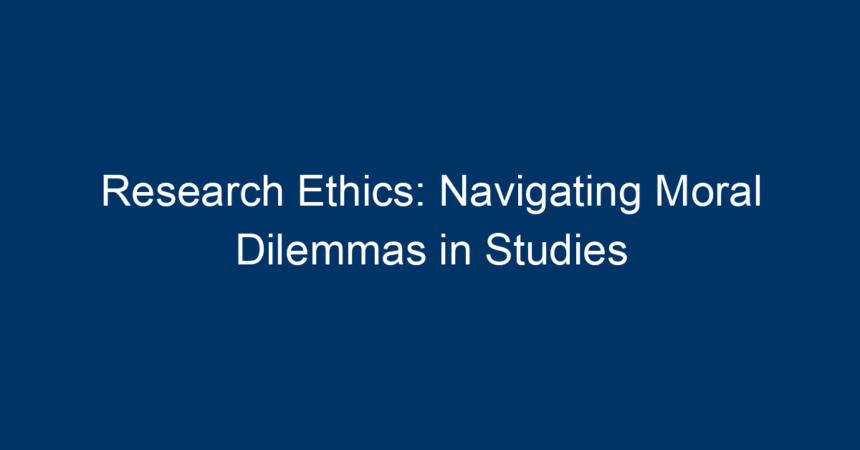In today’s fast-paced world, the importance of conducting research ethically cannot be overstated. Whether in the fields of medicine, social science, or technology, navigating the complex landscape of research ethics is essential. Researchers face various moral dilemmas that can significantly impact their work, their subjects, and broader society. In this comprehensive guide, we will delve into the principles of research ethics, explore common ethical dilemmas researchers encounter, and provide actionable insights for maintaining integrity in research.
Understanding Research Ethics
Research ethics refers to the principles that guide researchers in conducting their work responsibly and ethically. These principles serve as a foundational framework, ensuring that the rights, dignity, and welfare of research participants are protected. Key components of research ethics include:
-
Informed Consent: Participants must be fully informed about the nature, purpose, risks, and benefits of the study. They should voluntarily agree to participate without any coercion.
-
Confidentiality: Researchers are obligated to protect the privacy of participants by keeping their personal information confidential.
-
Integrity: Researchers should strive for honesty and transparency in conducting and reporting their work, avoiding fabrication or manipulation of data.
- Justice: The benefits and burdens of research should be distributed fairly among all groups, minimizing exploitation of vulnerable populations.
Understanding these principles lays the groundwork for ethical research practices.
Common Ethical Dilemmas in Research
1. Balancing Risks and Benefits
One primary ethical dilemma researchers face is striking the right balance between potential risks to participants and the benefits of the research. For example, in clinical trials, researchers must evaluate whether the medical advancements outweigh any possible adverse effects on participants. Ethically, the potential benefits should justify the risks involved.
2. Informed Consent Challenges
Obtaining informed consent is not always straightforward. In certain studies, particularly those involving vulnerable populations (like children or individuals with cognitive impairments), ensuring genuine understanding can become complex. Researchers must develop accessible consent procedures and materials while ensuring participants comprehend what they are agreeing to.
3. Cultural Sensitivity and Respect
When conducting research across diverse cultures, researchers may face challenges related to cultural sensitivity. Different cultures have unique beliefs and practices that may either support or oppose certain research designs. Ignoring cultural contexts can lead to ethical breaches and harm relationships with communities that researchers depend on for their work.
4. Data Management and Privacy Concerns
With the rise of digital data collection, protecting participant privacy is increasingly significant. Researchers often collect personal and sensitive information, requiring robust data management protocols to prevent breaches. Ethical obligations include ensuring anonymization and secure storage of data, thus maintaining confidentiality.
5. Publication Ethics
Scholarly publication poses its own set of ethical challenges. Issues such as plagiarism, authorship disputes, and the manipulation of results can undermine the credibility of research. Researchers must adhere to publishing ethics to maintain integrity in their work and the broader academic community.
Best Practices for Upholding Research Ethics
Integrating robust ethical practices is crucial for researchers to navigate moral dilemmas. Here’s how you can uphold research ethics in your studies:
1. Develop a Clear Ethical Framework
Before commencing any research project, establish a well-defined ethical framework. This framework should outline your responsibilities, the ethical principles guiding your research, and a plan for addressing potential dilemmas.
2. Engage with Institutional Review Boards (IRBs)
Consulting with an Institutional Review Board (IRB) is essential in navigating research ethics. IRBs provide critical oversight, ensuring that your study meets ethical standards. Engaging them early in the research process can be invaluable in identifying and mitigating ethical risks.
3. Prioritize Training in Research Ethics
Providing training for all research team members about research ethics is vital. Ensure that everyone involved understands ethical principles, the importance of informed consent, data management practices, and cultural sensitivity. Continuous education can foster a culture of ethical integrity.
4. Foster Open Communication
Create an environment of open communication within your research team. Encourage team members to discuss any ethical concerns that arise during the research process. This collaborative approach can help in identifying and addressing dilemmas promptly.
5. Be Transparent in Your Research
Transparency in the research process includes openly sharing methodologies, results, and challenges encountered. Being forthright about limitations and possible conflicts of interest can enhance the credibility of your work and build trust with participants and the broader community.
Conclusion: A Call to Ethical Responsibility
Navigating moral dilemmas in research is an ongoing journey that requires constant vigilance, reflection, and commitment to ethical practices. By understanding the principles of research ethics and employing strategies to address common dilemmas, researchers can conduct their work with integrity and respect for participants.
The importance of research ethics extends beyond individual studies—it shapes the future of research as a whole. Upholding these ethical standards is not only a legal obligation but a moral imperative that protects participants and promotes the credibility of the research community.
As a researcher, you have the power to influence the ethical landscape of your field. By prioritizing ethical considerations, fostering a culture of transparency and communication, and engaging with oversight bodies, you can navigate moral dilemmas in research more effectively. Ultimately, ethical research contributes not only to the advancement of knowledge but also to the betterment of society.
Actionable Insights:
- Establish and follow a clear ethical framework for all research projects.
- Engage with an Institutional Review Board at the onset of your research to ensure compliance with ethical standards.
- Invest in training your research team on ethical practices to foster a culture of accountability.
- Encourage open discussions about ethical concerns within your research team.
- Commit to transparency in your findings to build credibility and trust within the research community.
By embracing these practices, researchers can navigate the complexities of research ethics and contribute positively to their fields while safeguarding the well-being of their participants.




